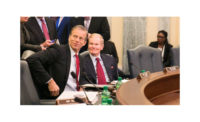The Senate has passed a three-year reauthorization of federal aviation programs, including a modest increase for airport construction grants. Senate passage of the bill came on June 12, by an overwhelming 94-0 vote.
Senate action came one day after the House approved its version of the aviation measure, a four-year renewal of the Federal Aviation Administration programs, with even higher funding for Airport Improvement Program construction grants.
The next step for the legislation, which would be the successor to the Wendell H. Ford Aviation Investment and Reform Act of 2000 (AIR-21), is a House-Senate conference to work out differences between the respective bills.
Construction officials will be paying closest attention to how conferees settle the spread on funding for AIP grants. The Senate bill provides $3.4 billion for that program in fiscal 2004, just $20 million more than this year's appropriation. It then increases funding to $3.5 billion in 2005 and $3.6 billion in 2006. The House version also allocates $3.4 billion for AIP in 2004, but then pushes the funding up to $3.6 billion in 2005, $3.8 billion in 2006 and $4 billion in 2007, the measure's final year.
But the Senate legislation also establishes a separate $500-million-a year "aviation security capital fund" to help airports pay for installing required baggage-screening machines.
Senate appropriators successfully added an amendment to the bill, specifying that the bill only authorized the new fund and that it would be up to the Appropriations Committee to say how much money would flow each year from that account for airports.
Sen. Robert Byrd of West Virginia, the senior Democrat on the Appropriations panel, contended that the earlier version's earmark for airport security would leave "a $500-million hole" in the Transportation Security Administration budget.
The aviation security fund would be financed through security fees airline passengers now pay. The money would go into the general Treasury, not the Airport and Airway Trust Fund, which covers AIP.
The House bill doesn't have a new airport security account, although the chamber's Transportation and Infrastructure Committee has approved a separate measure establishing a security program at the same funding level contained in the Senate's bill.
The White House issued statements saying it strongly supports the House and Senate bills, but has said it objects to provisions in each bill. The White House also says that it wants to work in conference to bring the funding levels more in line with the lower amounts it recommended. The administration's proposal would hold AIP at $3.4 billion annually for three years.
But Transportation Secretary Norman Y. Mineta told reporters June 12 that with no new taxes or fees in the House and Senate aviation bills, "We're not drawing a line in the sand on the [bills'] level of funding right now."



